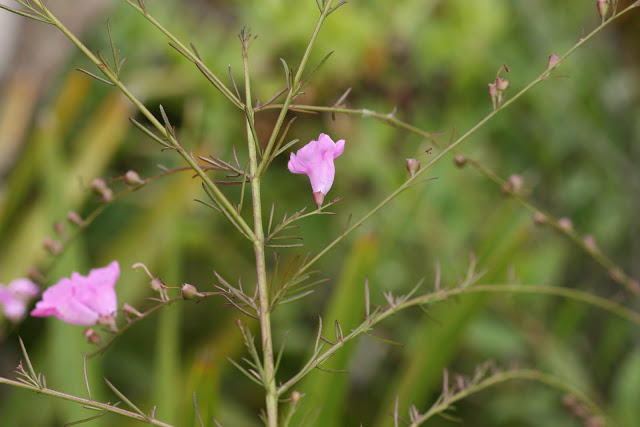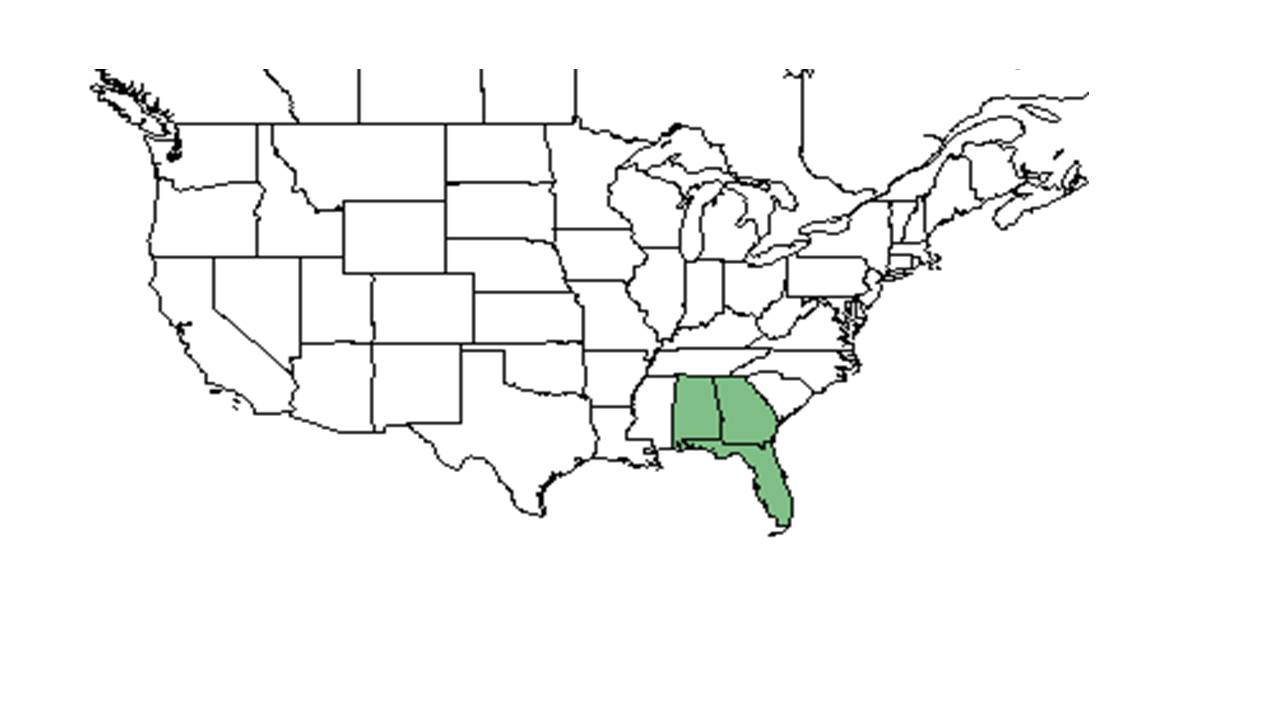Difference between revisions of "Agalinis filifolia"
(→Pollination) |
|||
| (60 intermediate revisions by 10 users not shown) | |||
| Line 3: | Line 3: | ||
{{taxobox | {{taxobox | ||
| name = Agalinis filifolia | | name = Agalinis filifolia | ||
| − | | image = | + | | image = Agal_fili.jpg |
| − | | image_caption = | + | | image_caption = Photo by Craig Huegel |
| regnum = Plantae | | regnum = Plantae | ||
| divisio = Magnoliophyta - Flowering plants | | divisio = Magnoliophyta - Flowering plants | ||
| Line 15: | Line 15: | ||
| binomial_authority = (Nutt.) Raf. | | binomial_authority = (Nutt.) Raf. | ||
| range_map = AGAL_FILI_dist.jpg | | range_map = AGAL_FILI_dist.jpg | ||
| − | | range_map_caption = Natural range of ''Agalinis filifolia'' from USDA NRCS [http://www.plants.usda.gov Plants Database]. | + | | range_map_caption = Natural range of ''Agalinis filifolia'' from USDA NRCS [http://www.plants.usda.gov/core/profile?symbol=AGFI2 Plants Database]. |
}} | }} | ||
| − | Common names: Seminole | + | Common names: Seminole false foxglove; fine-leaf gerardia; Seminole agalinis |
| − | + | ==Taxonomic notes== | |
| − | + | Synonym: ''Gerardia filifolia'' Nutt.<ref name=weakley>Weakley, A.S. 2020. Flora of the Southeastern United States. Edition of 20 October 2020. University of North Carolina at Chapel Hill, Chapel Hill, North Carolina.</ref> | |
==Description== | ==Description== | ||
<!-- Basic life history facts such as annual/perrenial, monoecious/dioecious, root morphology, seed type, etc. --> | <!-- Basic life history facts such as annual/perrenial, monoecious/dioecious, root morphology, seed type, etc. --> | ||
| − | + | ''A. filifolia'' is an annual.<ref name="hall">Hall, David W. Illustrated Plants of Florida and the Coastal Plain: based on the collections of Leland and Lucy Baltzell. 1993. A Maupin House Book. Gainesville. 341. Print.</ref> | |
| − | |||
==Distribution== | ==Distribution== | ||
| − | + | ''A. filifolia'' species is frequent in all of Florida, to which it is almost endemic, except for populations just over the line of Georgia and Alabama.<ref name="hall"/> In Georgia it is listed as critically imperiled.<ref name="natureserve">[[http://explorer.natureserve.org/servlet/NatureServe?searchName=Agalinis+filifolia]]NatureServe. Accessed: March 22, 2016</ref> | |
==Ecology== | ==Ecology== | ||
===Habitat=== <!--Natural communities, human disturbed habitats, topography, hydrology, soils, light, fire regime requirements for removal of competition, etc.--> | ===Habitat=== <!--Natural communities, human disturbed habitats, topography, hydrology, soils, light, fire regime requirements for removal of competition, etc.--> | ||
| − | + | ''A. filifolia'' is found in sandhills, coastal scrub,<ref name="wunderlin">Wunderlin, Richard P. and Bruce F. Hansen. Guide to the Vascular Plants of Florida. Second edition. 2003. University Press of Florida: Gainesville/Tallahassee/Tampa/Boca Raton/Pensacola/Orlando/Miami/Jacksonville/Ft. Myers. 546. Print.</ref> longleaf pine savannas, sandy pinewoods and barrens, and on sand dunes, flats, and interdune hollows. Other habitats include open stands of evergreen oak shrub, flatwoods, saw-palmetto woods, borders of titi bogs, and in dry sandy scrub that borders mesic woodlands.<ref name="fsu">Florida State University Robert K. Godfrey Herbarium database. URL: http://herbarium.bio.fsu.edu. Last accessed: June 2014.Collectors: Sidney M. Daniel, Robert K. Godfrey, R. Kral, Loran C. Anderson, J. B. Hilmon, J. M. Canne, Mark A. Garland, Gary R. Knight, Nancy Endmonson, Cecil R. Slaughter, and Jean W. Wooten. States and Counties: Florida: Wakulla, Franklin, Liberty, Bay, Escambia, Charlotte, Brevard, Nassau, Putnam, Sarasota, Taylor, Manatee, and Lake. Georgia: Thomas</ref> | |
| + | |||
| + | ''A. filifolia'' is somewhat shade tolerant and found in a variety of moisture conditions, from dry to wet.<ref name="hall"/> It is observed in mainly sandy soils, including loamy sand. It can also be found in disturbed habitats, including clear-cuts and pine plantations, roadside banks and ditches, and clearings for power lines.<ref name="fsu"/> | ||
| + | |||
| + | Associated species include ''[[Morella cerifera]], [[Aristida stricta]], Myrica pusilo, Aristida spiciformis'', and ''Serenoa repens''.<ref name="fsu"/> | ||
===Phenology=== <!--Timing off flowering, fruiting, seed dispersal, and environmental triggers. Cite PanFlora website if appropriate: http://www.gilnelson.com/PanFlora/ --> | ===Phenology=== <!--Timing off flowering, fruiting, seed dispersal, and environmental triggers. Cite PanFlora website if appropriate: http://www.gilnelson.com/PanFlora/ --> | ||
| − | This species has been observed flowering August through October, and fruiting August through November | + | This species has been observed flowering August through October, with most flowering in September and October<ref name="fsu"/><ref>Nelson, G. [http://www.gilnelson.com/ PanFlora]: Plant data for the eastern United States with emphasis on the Southeastern Coastal Plains, Florida, and the Florida Panhandle. www.gilnelson.com/PanFlora/ Accessed: 19 MAY 2021</ref>, and fruiting August through November.<ref name="fsu"/> |
| + | <!--===Seed dispersal===--> | ||
| + | <!--===Seed bank and germination===--> | ||
| + | <!--===Fire ecology===--><!--Fire tolerance, fire dependence, adaptive fire responses--> | ||
| − | |||
| − | |||
| − | |||
===Pollination=== | ===Pollination=== | ||
| − | + | ''Polites vibex'' (the whirlabout or skipper) is known for nectaring ''A. filifolia''.<ref name="Leary 2016">Observation by Patrick R. Leary in both Four Crees State Forest, Nassau County, FL, September 23, 2016, posted to Florida Flora and Ecosystematics Facebook Group September 23, 2016.</ref> Additionally, ''A. filifolia'' was observed at the Archbold Biological Station to host bees from the Apidae family such as ''Apis mellifera, Bombus impatiens,'' and ''B. pennsylvanicus'', sweat bees from the family Halictidae such as ''Agapostemon spledens, Augochlorella aurata, A. gratiosa, Lasioglossum coreopsis, L. miniatulus, L. nymphalis, L. placidensis,'' and ''L. puteulanum'', and leafcutting bees from the family Megachilidae such as ''Megachile brevis psedudobrevis, M. mendica, M. petulans,'' and ''M. texana''.<ref>Deyrup, M.A. 2015. Database of observations of Hymenoptera visitations to flowering plants on Archbold Biological Station, Florida, USA.</ref> | |
| − | + | ===Herbivory and toxicology=== | |
| + | ''A. filifolia'' serves as larval food for the caterpillars of common buckeye butterflies.<ref name="hawthorn">[[http://hawthornhillwildflowers.blogspot.com/2012/12/seminole-false-foxglove-agalinus.html]]Native Florida Wildflowers. Accessed: March 22, 2016.</ref> ''Agalinis'' species, including this one, host larvae of the common buckeye butterfly (''Junonia coenia'') in Florida.<ref name="Hammer 2016">Observation by Roger Hammer in Silver Springs State Park, Marion County, FL. September 2016, posted to Florida Flora and Ecosystematics Facebook Group August 4, 2017.</ref> | ||
| + | <!--===Diseases and parasites===--> | ||
| − | + | ==Conservation, cultivation, and restoration== | |
| − | + | ==Cultural use== | |
| − | |||
| − | |||
| − | |||
| − | |||
==Photo Gallery== | ==Photo Gallery== | ||
| + | <gallery widths=180px> | ||
| + | </gallery> | ||
==References and notes== | ==References and notes== | ||
| − | |||
| − | |||
| − | |||
| − | |||
| − | |||
| − | |||
| − | |||
| − | |||
Latest revision as of 17:56, 17 May 2023
| Agalinis filifolia | |
|---|---|

| |
| Photo by Craig Huegel | |
| Scientific classification | |
| Kingdom: | Plantae |
| Division: | Magnoliophyta - Flowering plants |
| Class: | Magnoliopsida - Dicotyledons |
| Order: | Lamiales |
| Family: | Orobanchaceae |
| Genus: | Agalinis |
| Species: | A. filifolia |
| Binomial name | |
| Agalinis filifolia (Nutt.) Raf. | |

| |
| Natural range of Agalinis filifolia from USDA NRCS Plants Database. | |
Common names: Seminole false foxglove; fine-leaf gerardia; Seminole agalinis
Contents
Taxonomic notes
Synonym: Gerardia filifolia Nutt.[1]
Description
A. filifolia is an annual.[2]
Distribution
A. filifolia species is frequent in all of Florida, to which it is almost endemic, except for populations just over the line of Georgia and Alabama.[2] In Georgia it is listed as critically imperiled.[3]
Ecology
Habitat
A. filifolia is found in sandhills, coastal scrub,[4] longleaf pine savannas, sandy pinewoods and barrens, and on sand dunes, flats, and interdune hollows. Other habitats include open stands of evergreen oak shrub, flatwoods, saw-palmetto woods, borders of titi bogs, and in dry sandy scrub that borders mesic woodlands.[5]
A. filifolia is somewhat shade tolerant and found in a variety of moisture conditions, from dry to wet.[2] It is observed in mainly sandy soils, including loamy sand. It can also be found in disturbed habitats, including clear-cuts and pine plantations, roadside banks and ditches, and clearings for power lines.[5]
Associated species include Morella cerifera, Aristida stricta, Myrica pusilo, Aristida spiciformis, and Serenoa repens.[5]
Phenology
This species has been observed flowering August through October, with most flowering in September and October[5][6], and fruiting August through November.[5]
Pollination
Polites vibex (the whirlabout or skipper) is known for nectaring A. filifolia.[7] Additionally, A. filifolia was observed at the Archbold Biological Station to host bees from the Apidae family such as Apis mellifera, Bombus impatiens, and B. pennsylvanicus, sweat bees from the family Halictidae such as Agapostemon spledens, Augochlorella aurata, A. gratiosa, Lasioglossum coreopsis, L. miniatulus, L. nymphalis, L. placidensis, and L. puteulanum, and leafcutting bees from the family Megachilidae such as Megachile brevis psedudobrevis, M. mendica, M. petulans, and M. texana.[8]
Herbivory and toxicology
A. filifolia serves as larval food for the caterpillars of common buckeye butterflies.[9] Agalinis species, including this one, host larvae of the common buckeye butterfly (Junonia coenia) in Florida.[10]
Conservation, cultivation, and restoration
Cultural use
Photo Gallery
References and notes
- ↑ Weakley, A.S. 2020. Flora of the Southeastern United States. Edition of 20 October 2020. University of North Carolina at Chapel Hill, Chapel Hill, North Carolina.
- ↑ 2.0 2.1 2.2 Hall, David W. Illustrated Plants of Florida and the Coastal Plain: based on the collections of Leland and Lucy Baltzell. 1993. A Maupin House Book. Gainesville. 341. Print.
- ↑ [[1]]NatureServe. Accessed: March 22, 2016
- ↑ Wunderlin, Richard P. and Bruce F. Hansen. Guide to the Vascular Plants of Florida. Second edition. 2003. University Press of Florida: Gainesville/Tallahassee/Tampa/Boca Raton/Pensacola/Orlando/Miami/Jacksonville/Ft. Myers. 546. Print.
- ↑ 5.0 5.1 5.2 5.3 5.4 Florida State University Robert K. Godfrey Herbarium database. URL: http://herbarium.bio.fsu.edu. Last accessed: June 2014.Collectors: Sidney M. Daniel, Robert K. Godfrey, R. Kral, Loran C. Anderson, J. B. Hilmon, J. M. Canne, Mark A. Garland, Gary R. Knight, Nancy Endmonson, Cecil R. Slaughter, and Jean W. Wooten. States and Counties: Florida: Wakulla, Franklin, Liberty, Bay, Escambia, Charlotte, Brevard, Nassau, Putnam, Sarasota, Taylor, Manatee, and Lake. Georgia: Thomas
- ↑ Nelson, G. PanFlora: Plant data for the eastern United States with emphasis on the Southeastern Coastal Plains, Florida, and the Florida Panhandle. www.gilnelson.com/PanFlora/ Accessed: 19 MAY 2021
- ↑ Observation by Patrick R. Leary in both Four Crees State Forest, Nassau County, FL, September 23, 2016, posted to Florida Flora and Ecosystematics Facebook Group September 23, 2016.
- ↑ Deyrup, M.A. 2015. Database of observations of Hymenoptera visitations to flowering plants on Archbold Biological Station, Florida, USA.
- ↑ [[2]]Native Florida Wildflowers. Accessed: March 22, 2016.
- ↑ Observation by Roger Hammer in Silver Springs State Park, Marion County, FL. September 2016, posted to Florida Flora and Ecosystematics Facebook Group August 4, 2017.